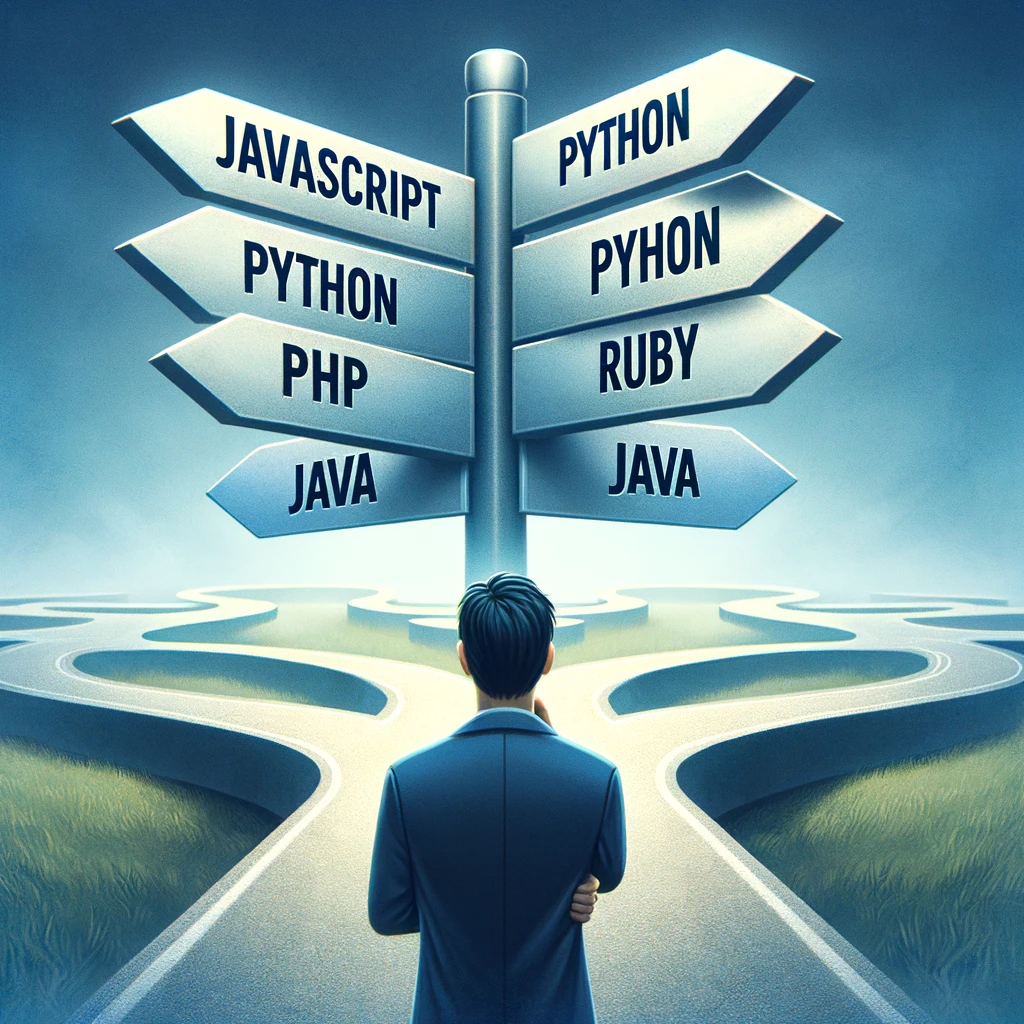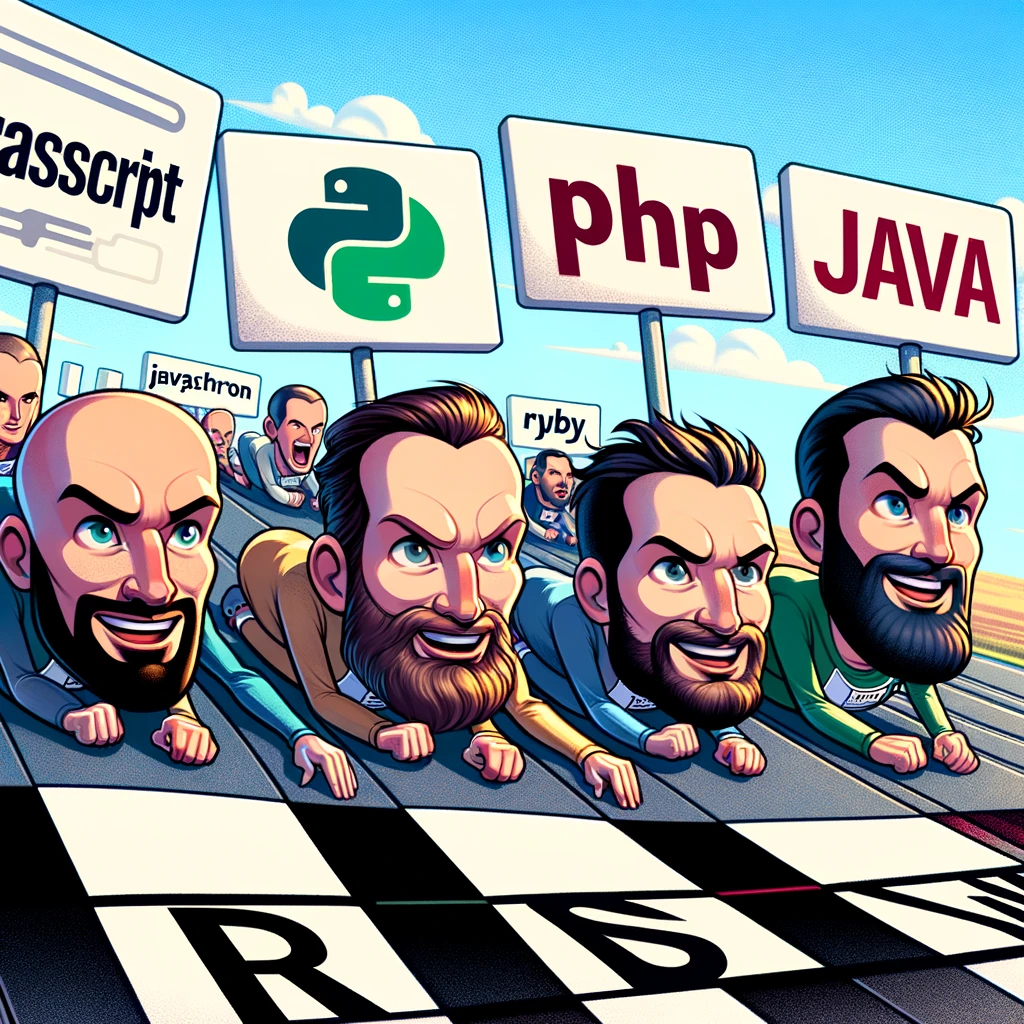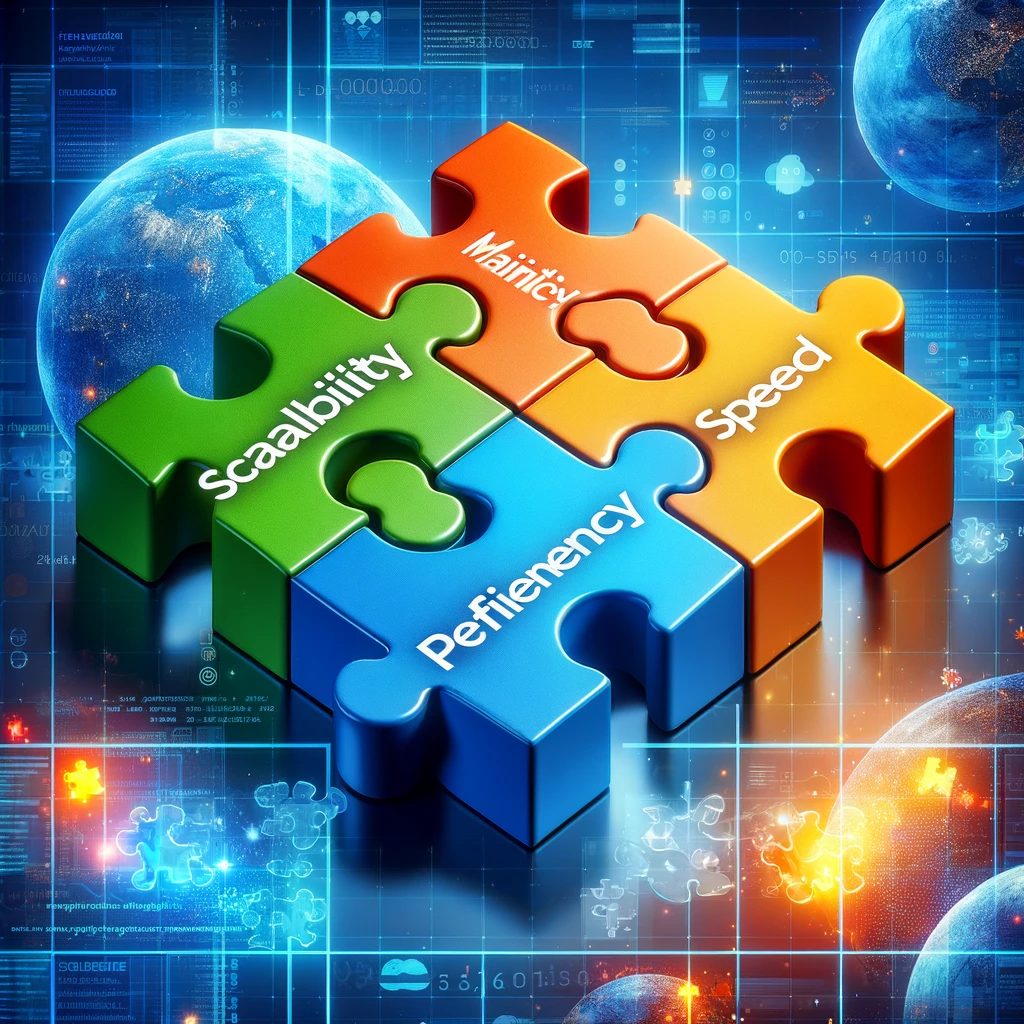I’m going to kick things off by emphasizing how pivotal the choice of a programming language is for web development. What Is The Best Programming Language For Web Development? It’s not a decision to make lightly – the language you pick can define the trajectory of your project. You’re going to find out about what makes a language tick for developers and their projects: its popularity, the support from its community, and its performance credentials, among other factors.
Web development is a dynamic field where technologies evolve at a breakneck pace. A lot is happening very quickly, and staying abreast of these changes is critical for anyone involved in the industry. This isn’t just about keeping up with the latest trends; it’s also about understanding the fundamental attributes that make a programming language well-suited for the web.
When you’re deciding on a language, it’s essential to consider various aspects such as:
- Ease of Use
- Learning Curve
- Integration Capabilities

Top Contenders in Web Development Programming Languages
A myriad of coding languages stand tall in the world of web development, each with its unique strengths and community backing. Now I’m going to walk you through some of the top contenders that have made a significant impact in how we design, develop, and deploy web applications.

JavaScript
If you’re well-acquainted with web development, you know JavaScript is virtually omnipresent. Its ability to run across all web browsers without the need for plugins catapulted it into a front-end development superstar. The language’s versatility isn’t its only selling point; the expansive ecosystem of libraries and frameworks, like Node.js, has transformed it into a full-stack marvel.
Python
Python’s ascent in the back-end domain is hard to overlook. Famous for its clean syntax and readability, Python makes it simpler for newcomers to climb aboard the development train. Plus, with powerful frameworks such as Django and Flask, developers can construct robust web applications with less code compared to some other languages.
PHP
PHP continues to hold a special place in web development, owing greatly to its seamless integration with HTML and a wide array of powerful frameworks like Laravel and Symfony. Covering over 78% of websites, PHP’s ease of use and a vast collection of pre-built functionalities make it a strong candidate for many web developers.
Ruby
Ruby on Rails, characterized by the philosophy of Convention over Configuration (CoC) and Don’t Repeat Yourself (DRY), offers a streamlined path to web application development. Although it’s not as widely adopted as JavaScript or PHP, its ability to facilitate rapid app development keeps it in the running.
Java
When it comes to industrial strength applications, Java’s robustness makes it the go-to language for many large enterprises. The presence of mature frameworks like Spring adds to the agility and scalability of Java, making it a respected choice for complex web-based services and applications.
Here is a table highlighting the various programming languages as of the last survey in 2023.
| Programming Language | Popularity | Usage Among Developers |
|---|---|---|
| JavaScript | 63.61% | 65.82% |
| Python | 49.28% | 45.32% |
| PHP | 18.58% | 19.03% |
| Ruby | 6.23% | 6.94% |
| Java | 30.55% | 30.49% |
Emerging Trends and New Players
In the fast-paced world of web development, staying abreast of emerging trends is crucial for making informed decisions. New programming languages and technology paradigms are continuously shaping the future of web development.
TypeScript
TypeScript, a superset of JavaScript, is gaining traction for its static typing and error-catching features. These aspects are particularly invaluable for larger teams working on complex projects, ensuring code reliability and maintainability.
Serverless
Serverless computing is radically changing how we think about backend architecture. Languages like Node.js are well-suited for this paradigm, offering flexibility and scalability without the overhead of server management.
Rust/Go
Then there’s Rust and Go, which are attracting attention for their performance and concurrency support. Though they’re newer to the web development scene, their potential for building fast and secure web services is notable.
React/Vue
Frameworks and libraries like React and Vue have also shifted the focus towards specific languages. For instance, React’s association with JavaScript has solidified the language’s importance in building dynamic user interfaces.
Other Tools
Looking beyond the languages themselves, the tools and ecosystems that support them are just as vital. Integrated development environments (IDEs), package managers, and other tools can significantly influence the productivity and satisfaction of a development team.

Choosing the Best Language for Your Web Development Project
I’m going to level with you – there isn’t a one-size-fits-all answer when it comes to picking the best programming language for web development. It’s about matching your project’s needs with the strengths of a language.
What You Should Consider

Scalability
Think about scalability. If you’re building a small blog, PHP might be your go-to. But for a high-traffic, dynamic web application, consider something like JavaScript with Node.js, or even Go, which can handle concurrency like a champ.
Maintainability
Maintainability is also key. Choose something that not only you but also any future developers can work with easily. That’s going to include a language with a clean syntax, wide community support, and extensive resources.
Speed
Then, there’s the development speed. You’re going to find out about frameworks like Django or Ruby on Rails, which can dramatically speed up your development process with their ‘batteries-included’ approach.
Proficiency
You can’t ignore the proficiency of your team. In my opinion, it’s better to work with a language your team is comfortable with rather than forcing a switch to something new just because it’s trending.
And remember, the tech landscape never stands still. A lot is happening very quickly, so keep an eye on trends. However, don’t jump on every bandwagon. Instead, choose something that resonates with you and has a proven track record.
Your first attempt doesn’t need to be your last. Technology evolves, and so should your tools. You can always adjust your approach down the road, selecting languages and frameworks that better suit the growing needs of your projects.
Now that you know how you should pick a web development language, it is important to know about some great coding practices and the difference between functional and object oriented concepts.
In winding up, remember this isn’t just about following what’s hot right now. It’s about making a strategic choice that sets your web development project up for long-term success. I really hope that you’ll take these insights and use them to steer your projects in the right direction. And hey, if you hit a bump or two along the way, that’s just part of the journey—innovation often comes from overcoming challenges.
I have been in the web development industry since 2016. It is my desire to guide aspiring and seasoned developers alike through the complex landscape of web development and software engineering. I combine my academic prowess, with degrees from Western Governor University and a Boot Camp certificate from Bloom Tech, with real-world experience to educate and inspire.
As the force behind DevTuneUp.com, I offer a treasure trove of tutorials, how-tos, and insights into the ever-evolving tech industry. With a sharp focus on demystifying technology and a goal to make DevTuneUp.com a cornerstone for tech enthusiasts, I leverage my expertise in SEO optimization and social media marketing to reach and empower a global audience. Join me on this journey to navigate the digital world with confidence and skill.
The article provides a comprehensive overview of the significance of choosing the right programming language for web development. It covers popular languages such as JavaScript, Python, PHP, Ruby, and Java, along with emerging trends like TypeScript, Serverless, and Rust/Go.
I would like to write down some positive aspects and suggestions for improvements
Positive Aspects: The article thoroughly covers various aspects of web development languages, including their popularity, community support, and performance. It also touches on emerging trends, providing a well-rounded view.
I like that the article has a clear structure, beginning with the importance of language choice and then delving into specific languages and emerging trends. You’ve created Insightful Descriptions of each programming language, highlighting their strengths, use cases, and community support. For instance, this helped me understand the practical implications of choosing a particular language.
My personal suggestions for Improvement- consider incorporating visual elements like graphs or charts to illustrate statistics on language popularity or adoption rates. This can make the content more engaging and easier to grasp. Case Studies or Examples: Including real-world case studies or examples of successful projects using specific languages could enhance the practical understanding for readers.
Ensure consistency in terminology. For example, the article refers to both “programming language” and “coding language.” I feel like using one consistent term throughout would provide clarity.
Some sentences are long and might benefit from breaking them down for better readability.
Overall, the article provides valuable information and guidance for choosing a programming language for web development.
Thank you for the insight. I can’t believe I didn’t think about a graph or visual like Google trends and the consistent language
Hi Jordan, thanks for the very informative article about the best programming language for web development. Actually, until reading your article, I never really understood what programming language is. I still wouldn’t call myself an expert but at least now I have a clue. I never realized what an impact choosing the right language has on the development of a website. So many choices! What’s a novice to do? Thanks for all the valuable information.
Bob
A novice would be better sticking with JavaScript and Python, because of the simple syntax
I agree with you and tend to be language agnostic when it comes to programming languages. I will let the project determine what language is best for the job. However, I’m not gonna lie I do have a few languages that I don’t particularly enjoy working with. PHP for one is not my favorite. For me PHP has just always been one that always looks like a jumbled mess and I struggle to make sense of it. Do you have a language that you don’t particularly like?
I don’t like PHP either. I will just use Node.JS for the runtime environment. I feel that JavaScript is more efficient, and plus you don’t have to learn a second language.
Having navigated various programming languages throughout my career, I must admit that your article provides a comprehensive overview of the considerations involved in choosing the right language for web development. In my journey, the choice of programming language often depended on the project’s specific requirements, scalability needs, and the development team’s expertise. Your article’s insights into factors such as performance, community support, and versatility align with the criteria I’ve considered when selecting a language for web development projects.
This was an insightful and comprehensive overview of various programming languages and their role in web development. I particularly appreciated how you emphasized the importance of considering factors like project requirements, scalability, community support, and personal preferences while choosing a language. It’s evident that you have a deep understanding of the subject matter.
considering the rapid advancements and evolving trends in web development, how do you suggest staying up-to-date with the latest programming languages and technologies? Are there any specific resources or strategies you would recommend to keep our skills relevant and competitive in the field?
I purchased various Udemy classes. There is also freeCodeCamp.com
That is totally free and you can set up Google alerts and find Google trends for programming languages.